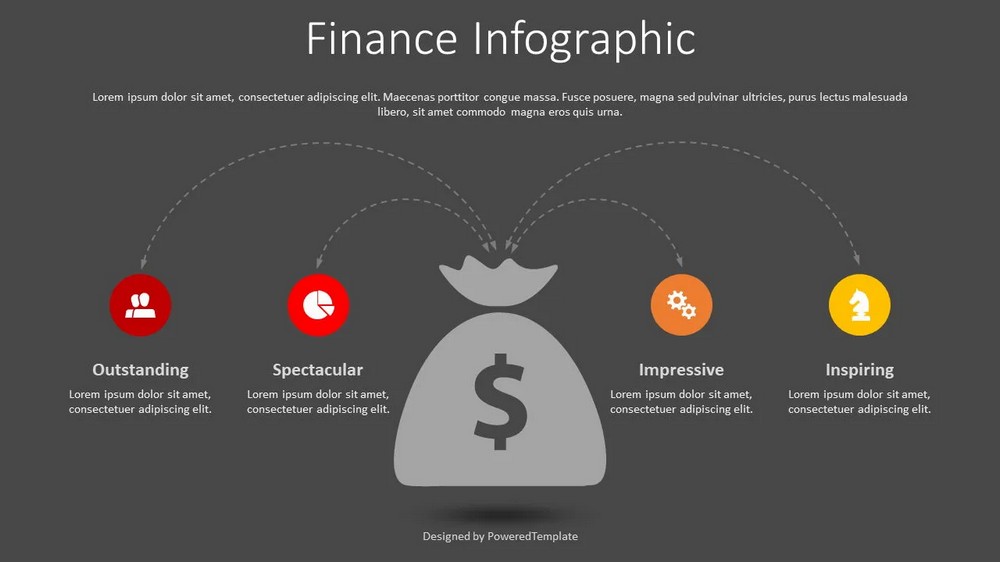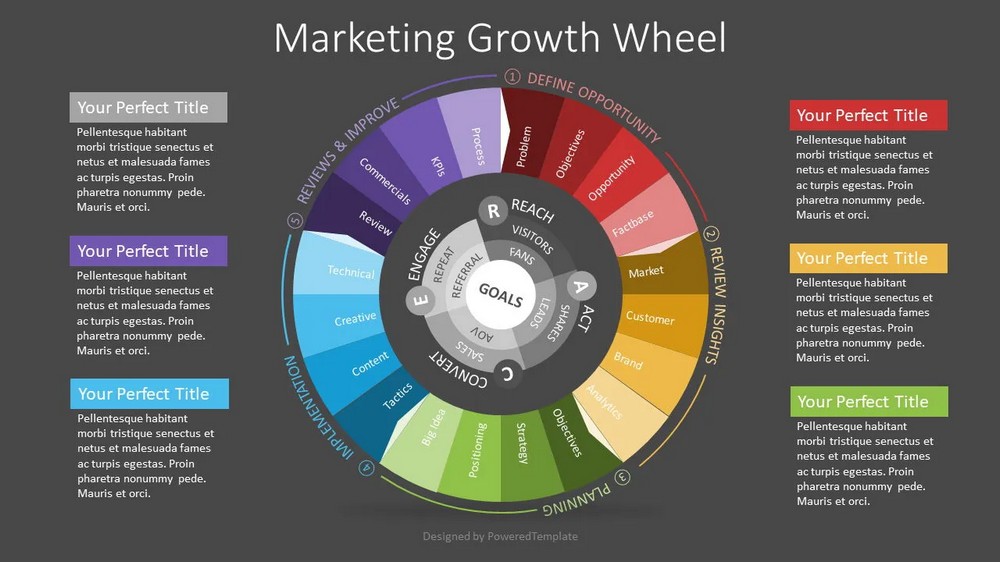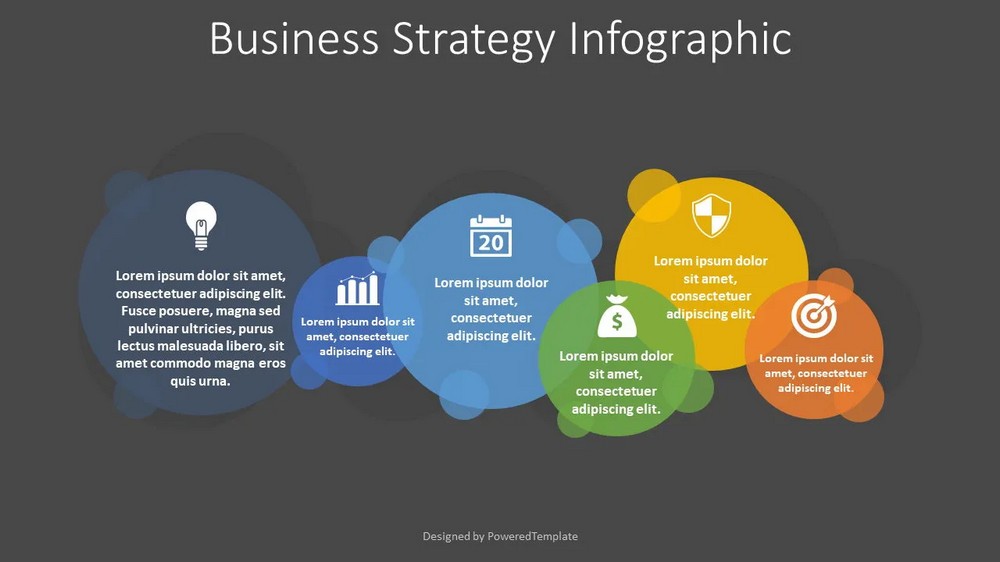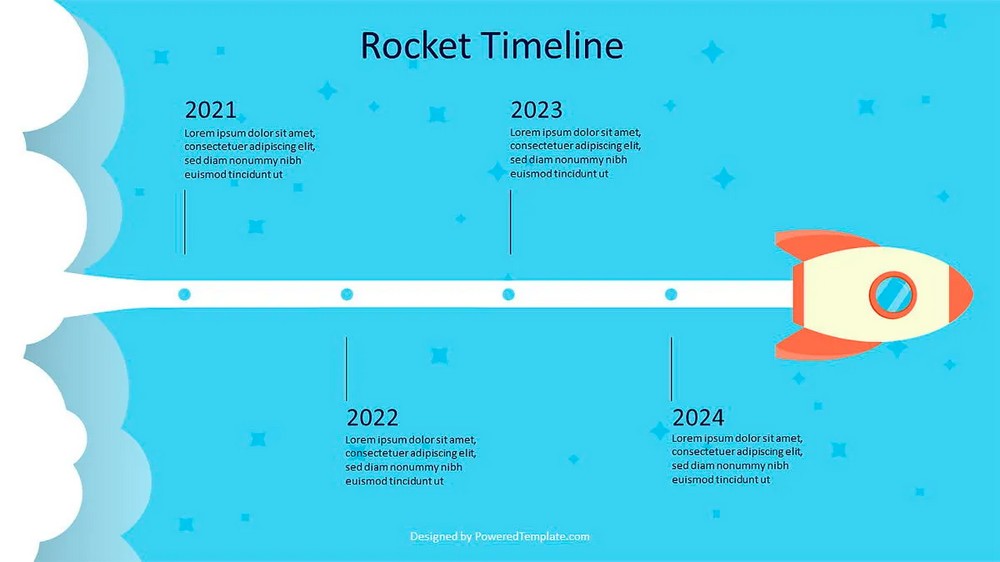This article provides insights into the venture capital audience. It emphasizes the importance of tailoring presentations to the venture capitalist audience and understanding their expectations.
In addition, the article provides an overview of venture capital and discusses key factors that venture capitalists consider when evaluating presentations. Finally, the article concludes by offering free presentation templates from the PoweredTemplate library that can be used to make an impression on venture investors.
Introduction: Сomposition of the venture capital audience

In the context of venture capital, the audience typically consists of individuals or groups who have an interest in venture capital investing, entrepreneurship, startups, and emerging technologies. This audience may include:
- Investors: These are individuals or institutions that provide capital to venture capital funds with the aim of generating returns on their investments. They may include high-net-worth individuals, family offices, pension funds, endowments, and institutional investors.
- Venture Capitalists: Professionals working in the venture capital industry, including general partners and associates, are an integral part of the audience. They attend conferences, seminars, and industry events to stay updated on trends, network with peers, and seek potential investment opportunities.
Venture capitalists play a vital role in the startup ecosystem by providing funding and support to innovative companies. As an entrepreneur seeking investment, it is crucial to deliver compelling presentations that capture the attention and interest of venture capital audience. Effective presentations can make a significant difference in securing funding for your business. - Service Providers: Individuals and firms that provide services to the venture capital industry, such as legal advisors, accountants, consultants, and technology providers, may form part of the venture capital audience. They offer specialized expertise and support to venture capital firms and startups.
It’s important to note that the specific composition of the venture capital audience may vary depending on the event, platform, or context in which the term is used.

This section highlights the importance of creating presentations that resonate with venture capitalists and provides tips for delivering impactful pitches.
Importance of Effective Presentations to Venture Capital Audience
Venture capitalists are constantly bombarded with pitches from numerous entrepreneurs seeking funding. To stand out in this competitive landscape, it is crucial to create presentations that make a lasting impression. Effective presentations can help you communicate your business idea clearly, demonstrate the potential for growth and profitability, and instill confidence in your ability to execute your vision.

By presenting a well-crafted pitch, you can capture the attention of venture capitalists and increase your chances of securing funding. A compelling presentation can create a sense of excitement, build trust, and differentiate your startup from the competition. Therefore, understanding the expectations and preferences of venture capitalists is key to creating presentations that resonate with this audience.
Overview of the Venture Capital Landscape
Before diving into the specifics of creating presentations for venture capital audience, it is essential to have a broad understanding of the venture capital landscape. Venture capital is a form of private equity investment that focuses on funding early-stage, high-potential companies. VCs typically invest in startups with the expectation of high returns within a relatively short period.
Venture capital firms raise funds from institutional investors, such as pension funds, endowments, and wealthy individuals. These funds are then invested in promising startups in exchange for an equity stake. Investors not only provide financial support but also offer expertise, mentorship, and access to valuable networks.

Understanding the dynamics of the venture capital industry will help you tailor your presentations to the unique requirements and expectations of this audience. By aligning your pitch with the venture capital landscape, you can increase your chances of attracting investment and securing partnerships that can fuel your startup’s growth.
Understanding the Venture Capital Audience
To create presentations that resonate with VCs, it is crucial to understand their characteristics, expectations, and evaluation criteria. This section explores the key aspects of the venture capital audience and provides insights into what they look for in presentations.
Properties of the Venture Capital Audience: Characteristics and Expectations
The venture capital audience consists of experienced investors who seek to identify and support high-potential startups. Typically, they have expertise in assessing business opportunities, evaluating risks, and predicting market trends.
We have listed their common characteristics and expectations below.
Financial returns
Financial returns are one of the primary considerations for venture capitalists when evaluating investment opportunities. They seek investments that have the potential to generate significant financial gains over a relatively short period. Here are some key points related to financial returns that they consider:
- Return on Investment (ROI): Investors analyze the projected return on their investment. They assess the potential for substantial financial gains and compare it to the risks associated with the investment. A high ROI potential is attractive to venture capitalists and increases the likelihood of securing funding.
- Growth Potential: Investors look for startups with a clear path to rapid growth. They seek opportunities where the investment can multiply in value within a few years. Startups that demonstrate the potential to capture a sizable market share and achieve significant revenue growth are more likely to attract venture capital.
- Profitability: VСs assess the profitability of a startup by evaluating its business model and financial projections. They want to see evidence of a viable and sustainable revenue-generating model that can eventually lead to profitability. Demonstrating a clear understanding of the company’s financials and a realistic plan for achieving profitability is crucial.
- Risk Assessment: VCs carefully evaluate the risks associated with an investment. They assess factors such as market competition, technological challenges, regulatory hurdles, and scalability issues. A comprehensive risk assessment that acknowledges potential obstacles and provides mitigation strategies can instill confidence in venture capitalists.

By addressing these financial considerations in your presentations and demonstrating a compelling potential for financial returns, you can capture the interest of venture capitalists audience and increase your chances of securing funding for your startup.
Market opportunity
Market opportunity is a crucial factor that investors consider when evaluating investment opportunities. They are interested in startups that operate in large and rapidly growing markets. Here are some key points related to market opportunity that venture capitalists look for:
- Market Size: They seek opportunities in markets with significant size and potential. They look for startups that address substantial market segments rather than niche markets. Demonstrating a large addressable market indicates the potential for scalability and significant financial returns.
- Market Growth: VCs are attracted to markets that show rapid growth potential. They seek startups operating in industries experiencing substantial market expansion or disruption. A growing market suggests increased demand and opportunities for market share capture.
- Trends and Market Dynamics: They keep a close eye on industry trends, technological advancements, and market dynamics. They seek opportunities aligned with emerging trends that have the potential to disrupt existing markets. Highlighting how your startup aligns with current market trends and capitalizes on emerging opportunities can be compelling.
- Market Entry Strategy: Venture capitalists evaluate the startup’s approach to entering the market. They want to see a clear strategy for market penetration, customer acquisition, and scaling operations. Presenting a well-defined go-to-market strategy that demonstrates a deep understanding of the target market can increase investor confidence.

By highlighting the market opportunity and demonstrating a deep understanding of the market dynamics, competition, and your startup’s unique value proposition, you can attract their attention. Showing that your startup operates in a large and growing market with untapped potential increases the appeal to venture capitalists and enhances your chances of securing funding.
Entrepreneurial team
The entrepreneurial team is a critical factor that investors consider when evaluating investment opportunities. Venture capitalists look for passionate, capable, and cohesive teams that have the vision, expertise, and drive to execute the business plan successfully. Here are some key points related to the entrepreneurial team that venture capitalists focus on:
- Experience and Expertise: VCs assess the background and experience of the entrepreneurial team members. They look for individuals with relevant industry knowledge, domain expertise, and a track record of success. Demonstrating deep industry understanding and expertise in key areas of the business increases investor confidence.
- Complementary Skill Sets: They prefer teams with complementary skill sets that cover various aspects of the business, such as technology, operations, marketing, finance, and sales. A well-rounded team that can effectively tackle different challenges and responsibilities is appealing to investors.
- Entrepreneurial Spirit and Commitment: Investors seek entrepreneurs who are passionate, driven, and committed to the success of the venture. They value individuals who are willing to take risks, persevere through challenges, and demonstrate a strong work ethic. Showing a genuine passion for the industry and unwavering commitment to the startup’s mission can be compelling.
- Leadership Abilities: Venture capitalists evaluate the leadership abilities of the entrepreneurial team. They want to see strong leadership qualities, including the ability to make sound decisions, adapt to changing circumstances, and effectively manage teams. Demonstrating leadership experience and the ability to inspire and motivate others is important.

By showcasing the strengths, experience, and capabilities of your entrepreneurial team, you can enhance the attractiveness of your startup to venture capital audience. Emphasize the team’s expertise, entrepreneurial spirit, leadership abilities, and commitment to executing the business plan. Demonstrating a cohesive and dynamic team that is well-equipped to tackle challenges can significantly increase your chances of securing funding.
Scalability
Scalability is an important factor that venture capitalists consider when evaluating investment opportunities. They look for startups that have the potential to scale their business rapidly and achieve significant growth. Here are some key points related to scalability that investors focus on:
- Business Model Scalability: They evaluate the scalability of the startup’s business model. They want to see a business model that can accommodate rapid growth without significant increases in costs or resource constraints. Scalable business models often leverage technology, automation, or network effects to increase efficiency and expand operations.
- Technology and Infrastructure: Venture capitalists consider the technological capabilities and infrastructure of the startup. They assess whether the technology can scale to meet increasing demand and whether the infrastructure can support growth without major bottlenecks. Scalable technology and infrastructure are essential for efficiently scaling operations.
- Operational Efficiency: VCs look for startups that demonstrate operational efficiency and the ability to scale without sacrificing quality or incurring excessive costs. They want to see streamlined processes, effective resource allocation, and a focus on optimizing operations as the business grows. Demonstrating a scalable operational framework is crucial.

By highlighting the scalability potential of your startup, you can attract venture capital audience attention. Showcase the size and growth potential of the market, demonstrate a scalable business model, emphasize the technology and infrastructure readiness, and present an efficient operational framework. Additionally, emphasize the scalability of your customer acquisition strategies, team, and financial projections. Demonstrating that your startup has the potential to scale rapidly and achieve significant growth can significantly enhance your chances of securing funding.
Exit strategy
An exit strategy is a crucial consideration for venture capitalists when evaluating investment opportunities. VCs invest in startups with the expectation of eventually realizing a return on their investment. Here are some key points related to exit strategies that investors focus on:
- Initial Public Offering (IPO): Venture capitalists consider the potential for the startup to go public through an IPO as an exit strategy. They evaluate whether the startup has the growth trajectory, market position, and financial potential to pursue a successful IPO. Demonstrating a clear path to an IPO and outlining the steps and milestones required can be compelling.
- Acquisition: They also look for opportunities where the startup can be acquired by a larger company. They assess the potential for attracting acquisition interest from strategic buyers or established players in the industry. Highlighting potential acquirers and demonstrating the startup’s unique value proposition can increase attractiveness to venture capitalists.
- Secondary Market Sale: VCs may consider a secondary market sale as an exit strategy. This involves selling their stake in the startup to other investors or funds. They evaluate the potential for liquidity events in the secondary market and the availability of buyers for their shares.
- Recapitalization or Buyout: VCs consider the potential for a recapitalization or buyout as an exit strategy. This involves restructuring the ownership or management of the company, potentially allowing the venture capitalist to exit while new investors or management take over. Demonstrating potential opportunities for recapitalization or buyout can be appealing.
- Timeline and Return Expectations: VCs assess the projected timeline for the exit strategy and the potential returns on their investment. They want to see a realistic timeline for achieving the exit and a potential return that aligns with their investment expectations. Presenting a well-supported financial analysis and projections can enhance confidence in the potential returns.

By addressing these key points and presenting a well-defined exit strategy, you can enhance the attractiveness of your startup to venture capital audience. Articulate the potential for an IPO, acquisition, secondary market sale, recapitalization, or buyout. Provide a clear timeline and demonstrate how the exit strategy aligns with market trends and potential returns. A well-thought-out exit strategy enhances the confidence of venture capitalists in the investment opportunity.
Understanding these characteristics and expectations will help you tailor your presentations to address the specific needs of the venture capital audience. By highlighting the key elements that align with their interests, you can capture their attention and demonstrate your startup’s potential for success.
Free Presentation Templates for Venture Capital Audience
To assist entrepreneurs in creating impactful presentations for venture capital audience, we have developed free presentation templates. These templates are designed to help you structure and present your ideas effectively, highlighting the key elements venture capitalists look for in presentations. You can customize these templates to suit your specific business and pitch requirements.
These templates provide a solid foundation for creating persuasive presentations that resonate with venture capitalists. Remember to customize the content to reflect your unique business and value proposition.
Conclusion
Creating effective presentations for VCs is crucial for attracting investment and securing support for your startup. By tailoring your presentations to the venture capital audience and understanding their expectations, you can increase your chances of success. This article has provided insights into the venture capital landscape, the characteristics and expectations of venture capitalists, and the key factors they consider when evaluating presentations. Additionally, we have offered free presentation templates that can serve as a starting point for crafting impactful pitches. Use these resources to captivate venture capitalists and demonstrate the potential of your startup to thrive in the competitive business landscape.

